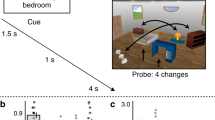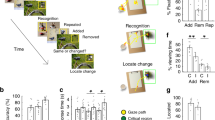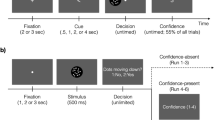Abstract
We aimed to discover the neural correlates of subjective judgments of learning—whereby participants judge whether current experiences will be subsequently remembered or forgotten—and to compare these correlates to the neural correlates of actual memory formation. During event-related functional magnetic resonance imaging, participants viewed 350 scenes and predicted whether they would remember each scene in a later recognition-memory test. Activations in the medial temporal lobe were associated with actual encoding success (greater activation for objectively remembered than forgotten scenes), but not with predicted encoding success (activations did not differ for scenes predicted to be remembered versus forgotten). Conversely, activations in the ventromedial prefrontal cortex were associated with predicted but not actual encoding success, and correlated with individual differences in the accuracy of judgments of learning. Activations in the lateral and dorsomedial prefrontal cortex were associated with both actual and predicted encoding success. These findings indicate specific dissociations and associations between the neural systems that mediate actual and predicted memory formation.
This is a preview of subscription content, access via your institution
Access options
Subscribe to this journal
Receive 12 print issues and online access
$209.00 per year
only $17.42 per issue
Buy this article
- Purchase on Springer Link
- Instant access to full article PDF
Prices may be subject to local taxes which are calculated during checkout




Similar content being viewed by others
References
Brewer, J.B., Zhao, Z., Desmond, J.E., Glover, G.H. & Gabrieli, J.D. Making memories: brain activity that predicts how well visual experience will be remembered. Science 281, 1185–1187 (1998).
Wagner, A.D. et al. Building memories: remembering and forgetting of verbal experiences as predicted by brain activity. Science 281, 1188–1191 (1998).
King, J.F., Zechmeister, E.B. & Shaughnessy, J.J. Judgments of knowing: the influence of retrieval practice. Am. J. Psychol. 93, 329–343 (1980).
Maki, R.H. & Berry, S.L. Metacomprehension of text material. J. Exp. Psychol. Learn. Mem. Cogn. 10, 663–679 (1984).
Thiede, K.W., Anderson, M.C. & Therriault, D. Accuracy of metacognitive monitoring affects learning of texts. J. Educ. Psychol. 95, 66–73 (2003).
Mazzoni, G. & Cornoldi, C. Strategies in study time allocation: why is study time sometimes not effective? J. Exp. Psychol. Gen. 122, 47–60 (1993).
Dunlosky, J., Kubat-Silman, A.K. & Hertzog, C. Training monitoring skills improves older adults' self-paced associative learning. Psychol. Aging 18, 340–345 (2003).
Dunlosky, J. et al. Inhalation of 30% nitrous oxide impairs people's learning without impairing people's judgments of what will be remembered. Exp. Clin. Psychopharmacol. 6, 77–86 (1998).
Izaute, M. & Bacon, E. Specific effects of an amnesic drug: effect of lorazepam on study time allocation and on judgment of learning. Neuropsychopharmacology 30, 196–204 (2005).
Vilkki, J., Surma-aho, O. & Servo, A. Inaccurate prediction of retrieval in a face matrix learning task after right frontal lobe lesions. Neuropsychology 13, 298–305 (1999).
Kennedy, M.R. & Yorkston, K.M. Accuracy of metamemory after traumatic brain injury: predictions during verbal learning. J. Speech Lang. Hear. Res. 43, 1072–1086 (2000).
Scoville, W.B. & Milner, B. Loss of recent memory after bilateral hippocampal lesions. J. Neurol. Neurosurg. Psychiatry 20, 11–21 (1957).
Corkin, S. What's new with the amnesic patient H.M.? Nat. Rev. Neurosci. 3, 153–160 (2002).
Kirchhoff, B.A., Wagner, A.D., Maril, A. & Stern, C.E. Prefrontal circuitry for episodic encoding and subsequent memory. J. Neurosci. 20, 6173–6180 (2000).
Fletcher, P.C. & Henson, R.N. Frontal lobes and human memory: insights from functional neuroimaging. Brain 124, 849–881 (2001).
Schnyer, D.M. et al. A role for right medial prefrontal cortex in accurate feeling-of-knowing judgments: evidence from patients with lesions to frontal cortex. Neuropsychologia 42, 957–966 (2004).
Nelson, T.O. A comparison of current measures of the accuracy of feeling-of-knowing predictions. Psychol. Bull. 95, 109–133 (1984).
Gusnard, D.A., Akbudak, E., Shulman, G.L. & Raichle, M.E. Medial prefrontal cortex and self-referential mental activity: relation to a default mode of brain function. Proc. Natl. Acad. Sci. USA 98, 4259–4264 (2001).
Stern, C.E. et al. The hippocampal formation participates in novel picture encoding: evidence from functional magnetic resonance imaging. Proc. Natl. Acad. Sci. USA 93, 8600–8665 (1996).
Epstein, R. & Kanwisher, N. A cortical representation of the local visual environment. Nature 392, 598–601 (1998).
Eldridge, L.L., Knowlton, B.J., Furmanski, C.S., Bookheimer, S.Y. & Engel, S.A. Remembering episodes: a selective role for the hippocampus during retrieval. Nat. Neurosci. 3, 1149–1152 (2000).
Cabeza, R., Rao, S.M., Wagner, A.D., Mayer, A.R. & Schacter, D.L. Can medial temporal lobe regions distinguish true from false? An event-related functional MRI study of veridical and illusory recognition memory. Proc. Natl. Acad. Sci. USA 98, 4805–4810 (2001).
Kikyo, H., Ohki, K. & Miyashita, Y. Neural correlates for feeling-of-knowing: an fMRI parametric analysis. Neuron 36, 177–186 (2002).
Maril, A., Simons, J.S., Mitchell, J.P., Schwartz, B.L. & Schacter, D.L. Feeling-of-knowing in episodic memory: an event-related fMRI study. Neuroimage 18, 827–836 (2003).
Wheeler, M.E. & Buckner, R.L. Functional dissociation among components of remembering: control, perceived oldness, and content. J. Neurosci. 23, 3869–3880 (2003).
Frith, C.D. & Frith, U. Interacting minds–a biological basis. Science 286, 1692–1695 (1999).
Kelley, W.M. et al. Finding the self? An event-related fMRI study. J. Cogn. Neurosci. 14, 785–794 (2002).
Schmitz, T.W., Kawahara-Baccus, T.N. & Johnson, S.C. Metacognitive evaluation, self-relevance, and the right prefrontal cortex. Neuroimage 22, 941–947 (2004).
Daselaar, S.M., Prince, S.E. & Cabeza, R. When less means more: deactivations during encoding that predict subsequent memory. Neuroimage 23, 921–927 (2004).
Damasio, H., Grabowski, T., Frank, R., Galaburday, A.M. & Damasio, A.R. The return of Phineas Gage: clues about the brain from the skull of a famous patient. Science 264, 1102–1105 (1994).
Tranel, D. Emotion, decision making, and the ventromedial prefrontal cortex. in Principles of Frontal Lobe Function (eds. Stuss, D.T. & Knight, R.T.) Ch. 22, 338–353 (Oxford University Press, London, 2002).
Moscovitch, M. & Winocur, G. The frontal cortex and working with memory. in Principles of Frontal Lobe Function (eds. Stuss, D.T. & Knight, R.T.) Ch. 12, 188–209 (Oxford University Press, London, 2002).
Nelson, T.O. & Narens, L. Metamemory: a theoretical framework and new findings. Psychol. Learn. Motiv. 26, 125–141 (1990).
Koriat, A. Monitoring one's own knowledge during study: a cue-utilization approach to judgments of learning. J. Exp. Psychol. Gen. 126, 349–370 (1997).
Hertzog, C., Dunlosky, J., Robinson, A.E. & Kidder, D.P. Encoding fluency is a cue used for judgments about learning. J. Exp. Psychol. Learn. Mem. Cogn. 29, 22–34 (2003).
Benjamin, A.S., Bjork, R.A. & Schwartz, B.L. The mismeasure of memory: when retrieval fluency is misleading as a metamnemonic index. J. Exp. Psychol. Gen. 127, 55–68 (1998).
Kelemen, W.L., Frost, P.J. & Weaver, C.A., III. Individual differences in metacognition: evidence against a general metacognitive ability. Mem. Cognit. 28, 92–107 (2000).
Schnyer, D.M., Nicholls, L. & Verfaellie, M. The role of VMPC in metamemorial judgments of content retrievability. J. Cogn. Neurosci. 17, 832–846 (2005).
Gomez-Beldarrain, M., Harries, C., Garcia-Monco, J.C., Ballus, E. & Grafman, J. Patients with right frontal lesions are unable to assess and use advice to make predictive judgments. J. Cogn. Neurosci. 16, 74–89 (2004).
Petrides, M. Specialized systems for the processing of mnemonic information within the primate frontal cortex. Phil. Trans. R. Soc. Lond. B 351, 1455–1461 (1996).
Chua, E.F., Rand-Giovannetti, E., Schacter, D.L., Albert, M.S. & Sperling, R.A. Dissociating confidence and accuracy: functional magnetic resonance imaging shows origins of the subjective memory experience. J. Cogn. Neurosci. 16, 1131–1142 (2004).
Reber, P.J. et al. Neural correlates of successful encoding identified using functional magnetic resonance imaging. J. Neurosci. 22, 9541–9548 (2002).
Schacter, D.L. & Worling, J.R. Attribute information and the feeling of knowing. Can. J. Psychol. 39, 467–475 (1985).
Acknowledgements
The authors thank S. Gabrieli, P. Mazaika, J. Cooper, A.R. Preston and P. Sokol-Hessner for their assistance or comments. This research was sponsored by grants from the US National Institute of Mental Health to Y.-C.K. (MH073234) and J.D.E.G. (MH59940).
Author information
Authors and Affiliations
Corresponding author
Ethics declarations
Competing interests
The authors declare no competing financial interests.
Rights and permissions
About this article
Cite this article
Kao, YC., Davis, E. & Gabrieli, J. Neural correlates of actual and predicted memory formation. Nat Neurosci 8, 1776–1783 (2005). https://doi.org/10.1038/nn1595
Received:
Accepted:
Published:
Issue Date:
DOI: https://doi.org/10.1038/nn1595
This article is cited by
-
Similar history biases for distinct prospective decisions of self-performance
Scientific Reports (2020)
-
Judgment of Learning Accuracy in High-functioning Adolescents and Adults with Autism Spectrum Disorder
Journal of Autism and Developmental Disorders (2016)
-
Metacognition and control of study choice in children
Metacognition and Learning (2013)
-
Executive functioning, metacognition, and self-perceived competence in elementary school children: an explorative study on their interrelations and their role for school achievement
Metacognition and Learning (2012)



